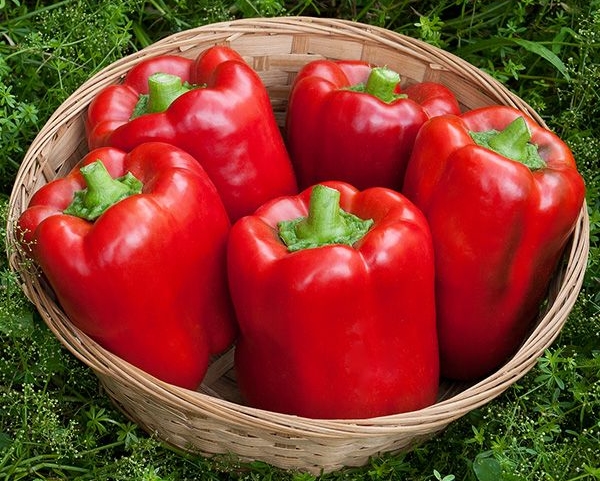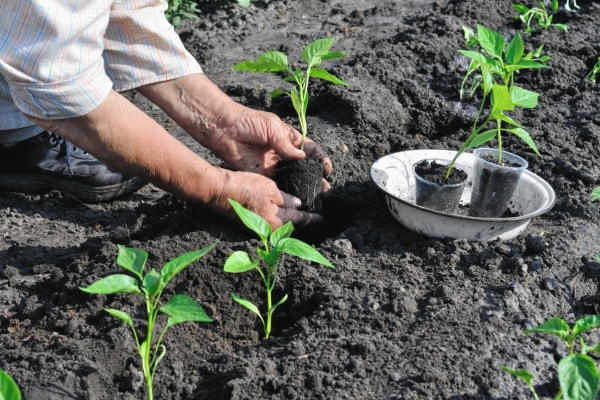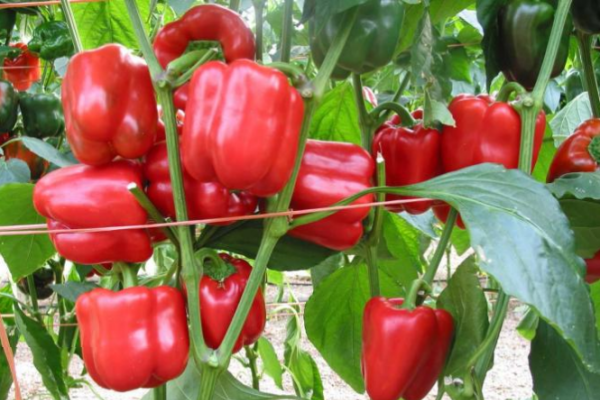Sweet pepper is a popular crop among gardeners. This vegetable has a pleasant sweetish taste, bright colors and a variety of forms. It is also rich in various vitamins and microelements. Pepper Californian miracle - a worthy representative of the varieties of sweet pepperwidely cultivated in central Russia.
Table of contents
Sweet pepper California miracle: characteristics and description of the variety
This variety bred by American breeders in 1928, is non-hybrid, although hybrid features are inherent in it. Main characteristics:
- middle ripeness, on maturation takes 110-130 days;
- height of the bush is about 50-60 cm;
- yield not less than 7-10 fruits from the bush;
- the fruits are large, round, weighing up to 160 grams, fleshy, with dense skin, have a pleasant sweetish taste;
- stress-resistant variety, successfully confronted with a mosaic virus;
- fruits are capable of being stored for a long time;
- You can eat fresh or make preparations for the winter.
Pepper is a California miracle, although thermophilic, considered quite unpretentious in growing. To achieve maximum yield and perfect taste of the fruit you need to follow some rules.

Growing seedlings
For cultivation of pepper the California miracle in an open ground in a midland of our country, plant seedlings need no later than February.
Then, when planting in the beds, seedlings reach an age of about 3 months.This is the optimal age for plant adaptation to possible adverse conditions and diseases.
Seed preparation for planting:
- seed disinfection with a solution of potassium permanganate (1-2%) at room temperature for 20 minutes. After processing, seed should be washed with running water;
- treatment with growth stimulants for strong and simultaneous shoots;
- soaking in hot water. Then the seeds are wrapped in cheesecloth and in order to prevent drying they are placed in a plastic bag and kept at a temperature of 20-25 ° C.
After 2-3 days, the first shoots will appear, then weak copies should be rejected.
Fertile soil can be bought in the store, and you can prepare yourself by mixing humus, garden soil and sand.
Sprouted seeds should be planted in the soil moistened with a sprayer, to a depth of about 1 cm. Then the soil should be moistened again gently and covered with plastic wrap.
Seedling content temperature - 26 ° -28 ° C, good illumination at this stage is not required.
After the emergence of shoots need to remove the film and provide good light shoots. In winter, you can arrange artificial lighting with energy-saving lamps, mounted on the seedlings.
Water the seedlings need warm water, moderately, but not allowing the land to dry out. Spraying is well suited to maintain a comfortable air humidity.
For the proper development of seedlings need to provide access to fresh air, but with protection from drafts. It is not necessary to feed the plants during this period.

Transplantation in open ground
With the beginning of the first warm spring days, it is recommended to begin gradually hardening the seedlings and teaching them to direct sunlight.
In the open ground seedlings are planted in May and Juneafter the weather has stabilized. In the greenhouse without heating can be planted earlier.
Growing the same crops in one place leads to soil depletion.Excellent pepper precursors California miracle - cabbage, carrots, beans, onions, cucumbers.
Before planting (approximately 3-5 days), the soil should be treated for pests and diseases with a weak solution of blue vitriol (1 tsp to a bucket of water).
The preparation of the seedlings of pepper itself is applying potassium phosphate fertilizer.
California pepper miracle grows well in light fertile soil, which is advised before planting add saltpeter at the rate of 40 g per 1 sq. m.

Landing and further care
Plants are planted under the scheme 40x40 in the heated soil (not less than 10 ° C). The depth of the wells should correspond to the height of the tank with seedlings.
Do not unnecessarily bury the seedlings and fill the basal neck with earth, otherwise rotting is possible. After planting should be watering the seedlings.
Subsequent care is simple:
- watering as needed;
- mulching - especially if the weather is hot and dry;
- fertilizer - about three times per season, an infusion of humus, chicken manure or mullein must be applied to the soil;
- loosening - regular and shallow;
- garter plants.
Subject to these recommendations, the California miracle pepper certainly will give you a great harvest in about 3-3.5 months.
For the formation of lateral shoots need to be staved upper leaves. In this case, the lowermost leaves are better not to touch, as they cover the ground at the roots and reduce the evaporation of moisture from the soil.
Slicing tips for pepper:
Possible problems with growing
A pale plant with a small green mass is evidence of a nitrogen deficiency. Twisted leaves with dry edges indicate a lack of nitrogen in the soil. If the reverse side of the leaves has acquired a purple hue, then it is a matter of a lack of magnesium.
Possible diseases:
- blackleg;
- white rot;
- peak rot;
- late blight;
- macroporiosis.
Possible pests:
- aphid - To combat it, it is necessary to treat the plants with a solution of whey (1.5 liters per bucket of water), and then sprinkle with wood ash;
- Medvedka - spraying with wood ash solution will help;
- Colorado beetle - manual collection of insects or spraying with a solution of the drug "Commander" in accordance with the instructions;
- bare slugs - control methods: timely weeding of beds and the preparation metaldehyde, whose granules need to be decomposed in the habitats of the pest (5g per 1 sq. M).

Seed collection
Need to pre-select a strong bush of pepper. After the appearance of the first buds, it should be covered with a small greenhouse, in order to avoid cross-pollination with neighboring plants.
After the formation of ovaries, the shelter is removed, and the plant is labeled for subsequent collection of purebred seeds from it.
Vegetable growers reviews
The reviews of vegetable growers about this variety are mostly positive, only sometimes the fruits may have a bitter taste associated with inappropriate growing conditions.
Tatyana: “This is my favorite sweet pepper variety! Fragrant, large, fleshy! It is good both in salads, and in preparations for the winter. Undemanding in care, there were no pests. ”
Igor Ivanovich: “We plant a variety of California miracle for several years. Bushes are strong, many fruits, tasty, sweetish. It is stored perfectly, for our middle band is the most! ”
Helena: “I bought a variety of pepper for testing the California miracle, 100% germination rate! In the ground they got accustomed with minimal losses. Caring as usual, watered a little. Already in August, the harvest started, it was enough for us and even treated the neighbors! ”
We hope that this material will help you in the cultivation of this amazing vegetable!
